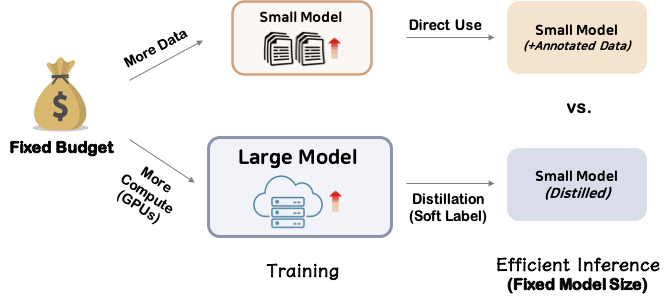This repository contains resources for the ACL 2023 paper Distill or Annotate? Cost-Efficient Fine-Tuning of Compact Models.
If you find our code, data or the paper useful, please cite the paper:
@inproceedings{kang-etal-2023-distill,
title={Distill or Annotate? Cost-Efficient Fine-Tuning of Compact Models},
author={Kang, Junmo and Xu, Wei and Ritter, Alan},
booktitle={Proceedings of the 61st Annual Meeting of the Association for Computational Linguistics (Volume 1: Long Papers)},
year={2023}
}
conda create --name <env> --file requirements.txt
For running distillation, download this unlabeled data for each task. Training/test sets are directly provided in each directory in this repository.
Here are the estimates of annotation cost per label for each dataset. You are encouraged to calculate the number of train data based on your fixed budget, given the following estimates. For more details, please refer to the paper.
| WLP | Stanceosaurus | FEVER | MultiPIT_id | MultiPIT_gen | NQ |
|---|---|---|---|---|---|
| $0.260 | $0.364 | $0.129 | $0.200 | $0.371 | $0.129 |
task=<task>
teacher_model=<teacher_model_path>
model=google/t5-v1_1-small
model_parallel_gpus=2
train_file=<unlabled_file>
dev_file=<dev_or_test_file>
train_batch=32
eval_batch=32
grad_accum=1
lr=3e-5
epochs=50
output_dir=<output_dir>
save_steps=5000
eval_steps=2000
time python ../run_t5.py \
--distillation \
--task $task \
--model_parallel_gpus $model_parallel_gpus \
--teacher_model_name_or_path $teacher_model \
--model_name_or_path $model \
--output_dir $output_dir \
--do_eval \
--validation_file $dev_file \
--per_device_eval_batch_size $eval_batch \
--predict_with_generate \
--source_prefix "<task>: " \
--source_column "source" \
--target_column "target" \
--do_train \
--train_file $train_file \
--per_device_train_batch_size $train_batch \
--gradient_accumulation_steps $grad_accum \
--num_train_epochs $epochs \
--learning_rate $lr \
--save_steps $save_steps \
--evaluation_strategy "steps" \
--eval_steps $eval_steps \
--report_to wandb \
--overwrite_output_dir
task=<task>
model=google/t5-v1_1-xxl
model_parallel_gpus=4
train_file=<train_data>
dev_file=<dev_or_test_data>
train_batch=32
eval_batch=32
grad_accum=1
lr=3e-5
epochs=20
output_dir=<output_dir>
save_steps=50000
eval_steps=2000
time python ../run_t5.py \
--task $task \
--model_parallel_gpus $model_parallel_gpus \
--model_name_or_path $model \
--output_dir $output_dir \
--do_eval \
--validation_file $dev_file \
--per_device_eval_batch_size $eval_batch \
--predict_with_generate \
--source_prefix "<task>: " \
--source_column "source" \
--target_column "target" \
--do_train \
--train_file $train_file \
--per_device_train_batch_size $train_batch \
--gradient_accumulation_steps $grad_accum \
--num_train_epochs $epochs \
--learning_rate $lr \
--save_steps $save_steps \
--evaluation_strategy "steps" \
--eval_steps $eval_steps \
--report_to wandb \
--overwrite_output_dir
